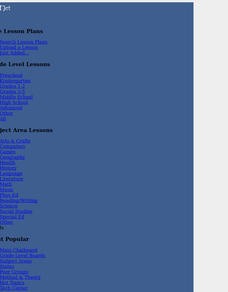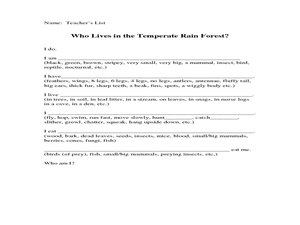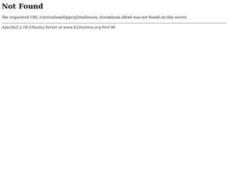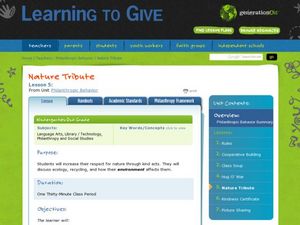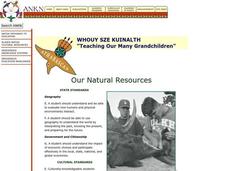Curated OER
November Science
Students review that all people, plants, and animals live on Earth. They classify objects found in the environment as living or nonliving.
Curated OER
School Forest Lesson- Looking at Literature
Students compare what they learned though literature to the school forest. In this environment lesson, students visit the forest surrounding their school to listen to literature and identify objects in nature. Students create a display...
Curated OER
Pollution
First graders identify and discuss different kinds and sources of of pollution. They explain why it is important to keep the environment free of pollution. They make a poster depicting the dangers of pollution and make litter boxes.
Curated OER
Waste Not, Want Not
Young scholars consider the types of debris that litters beaches and conduct research on waste management. They then interview professionals in a particular field of waste management and write reports for a booklet about garbage and...
Curated OER
Scientific Inquiry, Episode 1
Students look at ways to help the environment. In this recycling lesson, students watch a video on pollution and then collect trash at their school. They create posters to share with the school about the importance of recycling.
Curated OER
A Readers' Theatre for Bringing the Rain to Kapiti Plain
Second graders read and perform a reader's theater version of the story, "Bringing the Rain to Kapiti Plain." They complete a graphic organizer of cause and effect of their part in the story, look up vocabulary words on a dictionary...
Curated OER
Reduce, Reuse, Recycle
Students understand the process of recycling. They investigate how it improves the environment. They read the story "Don't Pollute" by Stan and Jan Berenstein. They analyze trash and sort it into bins.
Curated OER
Recycling!
The students recall events from Dr. Seuss' story The Lorax and make connections to environmental issues affecting their lives. They are expected to reflect on the facts of the story and respond verbally stating the inferences they made...
Curated OER
How Many Birds Would It Take To Keep A Jackal Alive?
Students examine the role of large families in some animal populations. They work together to complete an activity related to food supply. They discover the relationship between preys and predators.
Curated OER
Colonial Customs
Young scholars experience Colonial life and explore the customs of the 17th century. In this colonial America lesson plan, students play dress up, barter items, author pledges, and review 17th century etiquette.
Curated OER
Environmental Problems and Solutions
In this environmental problems and solutions worksheet, students are given a list of 25 environmental problems. They match them with a given solution and paste the matching pairs to a piece of construction paper.
Curated OER
Food Safety
Learners recognize that safe food preparation is important to good health. In this food safety lesson, students participate in an activity learners separate, clean, chill, and cook food safely. Students use Glo Germ to find where germs...
Curated OER
Layers of the Forest
Students explore rain forests. In this rain forest ecosystems lesson, students identify and describe the layers of the rain forest. Students paint and decorate a large rain forest mural. Students write riddles about animals that live in...
Curated OER
Sixth Grade Reading Quiz
In this reading worksheet, 6th graders answer multiple choice questions about passages they read, word parts, and more. Students complete 9 problems.
Curated OER
Pick It Up!
Students investigate recycling by creating receptacles that can hold trash or recyclable items. In this graphic design lesson plan, students encourage their classmates to help save the environment by using a recycling receptacle they...
Curated OER
Take a Dip: The Water in Our Lives
Young scholars explore the function of storm drains and the importance of keeping them clean of debris. They obtain permission from local authorities and perform community service painting stenciled messages near existing storm drains.
Curated OER
Garbage 2: Recycling
Students apply what they have learned about throwaway products "and the valuable natural resources from which they're derived" by thinking about where garbage goes after they throw it out. They also examine their own ideas and habits...
Curated OER
Forest Floor Terrarium
Students study the aspects of a forest floor ecosystem, including decomposition, the water cycle, food webs, the needs of living things, and physical vs. chemical change over an extended period. In addition, students conduct observations...
Curated OER
Soil Formation
In this soil formation worksheet, students will review examples of chemical weathering and biological weathering. Students will also review the different soil layers and how they are created. This worksheet has 6 matching, 5 multiple...
Curated OER
Treacherous Trash
Learners recognize the harmful effects people have on the environment. For this environmental lesson, students simulate water pollution clean-up by using tangled objects and untangling them in a cooperative group. Learners identify why...
Curated OER
Save the Earth: It's Everyone's Home!
Students complete activities to become more aware of environmental issues and the effect on plants and animals. In this environmental issues lesson, students use a globe to discuss issues with the environment. Students then take a trip...
Curated OER
Cleaning Up
Students demonstrate how to be a philanthropist. In this philanthropy lesson, students read the story The Wartville Wizard and discuss ways to become a philanthropist. Students participate in a good deed by volunteering to clean up trash.
Curated OER
Nature Tribute
Students explore parts of nature. In this environmental lesson, students discuss how their actions can affect the environment and design a plan to clean up a specified area. Students practice good hygiene during the cleanup project.
Curated OER
Our Natural Resources
Students discuss key terms used to describe ecosystems and how humans are altering natural resources. They listen to the book, Grandfather's Wisdom, and list the renewable and nonrenewable resources they have used or consumed in the past...




